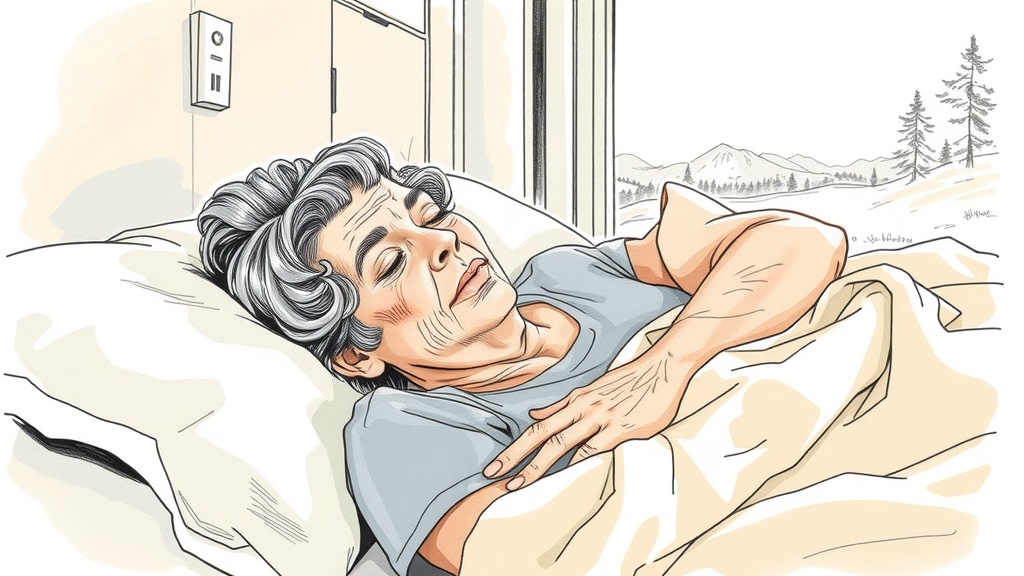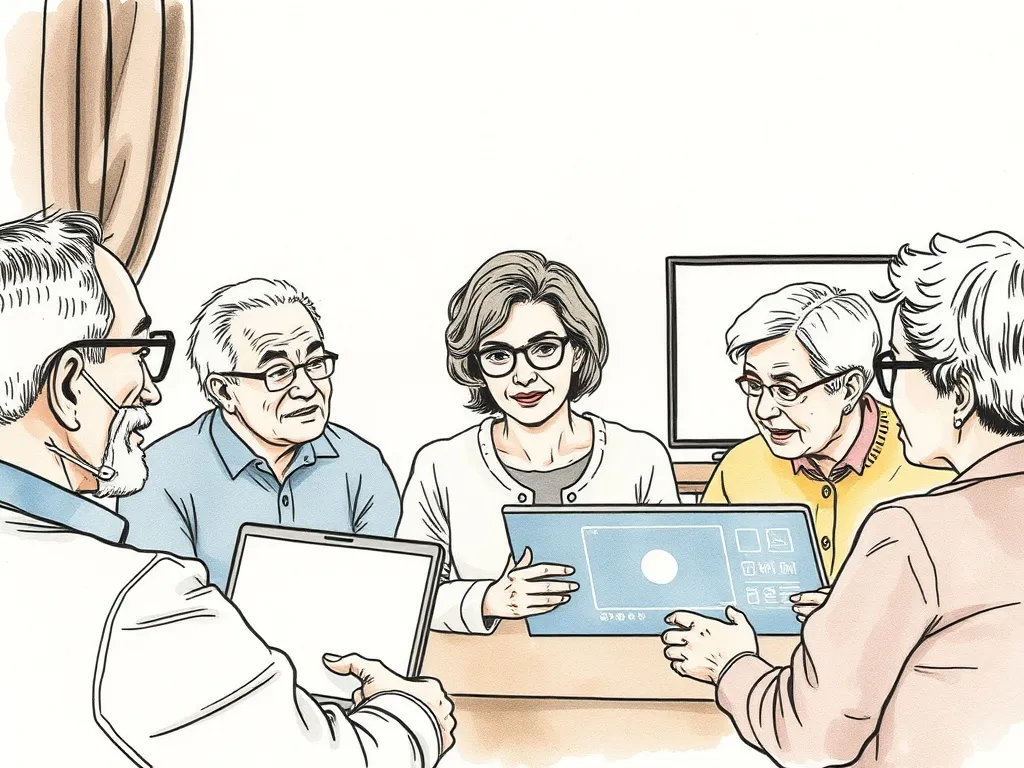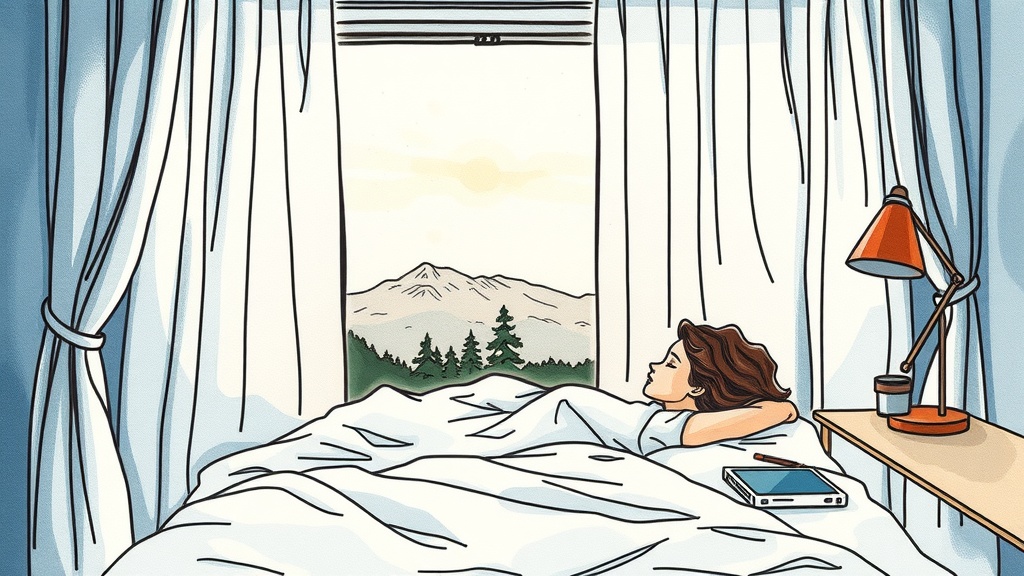· Don Schmidt · Guides · 9 min read
A Guide to Better Sleep for Seniors in Alberta: CBT-I as a Safe Alternative to Sleeping Pills
Discover how seniors in Alberta can achieve better sleep with CBT-I, a safe and effective alternative to sleeping pills, improving quality of life.

The Silent Struggle: Sleep Challenges for Seniors in Alberta
As we age, our sleep patterns naturally evolve. While it’s a common misconception that seniors need less sleep, the reality is that the quality of sleep often declines. Many older adults in Alberta find themselves battling insomnia, frequent awakenings, or feeling unrested despite spending ample time in bed. These sleep disturbances aren’t just an inconvenience; they can significantly impact overall health, cognitive function, mood, and even increase the risk of falls.
Several factors contribute to these challenges for seniors. Biological changes in the brain can alter the sleep-wake cycle, leading to lighter, more fragmented sleep. Medications, chronic health conditions like arthritis or heart disease, and lifestyle factors can also play a significant role. For Albertans, unique environmental elements, such as the extended daylight hours during summer months, can further disrupt natural sleep rhythms. Mastering sleep challenges unique to Alberta’s long summer days often requires tailored strategies, which can include techniques learned in therapies like CBT-I.
The consequences of persistent poor sleep are far-reaching. Seniors may experience increased daytime fatigue, reduced alertness, memory problems, a heightened risk of depression and anxiety, and a decreased ability to fight off illness. It’s a silent struggle that affects countless lives across the province.
The Problem with Traditional Sleeping Pills
In the face of chronic sleep issues, many seniors and their healthcare providers turn to traditional sleeping pills. Medications like benzodiazepines and “Z-drugs” are often prescribed to induce sleep. While they might offer a quick fix in the short term, their long-term use, especially for older adults, comes with a significant array of risks and potential side effects.
For seniors, these risks are amplified. Sleeping pills can lead to:
- Daytime drowsiness and impaired coordination: Increasing the risk of falls and hip fractures, a serious concern for older adults.
- Cognitive impairment: Affecting memory, concentration, and overall mental sharpness.
- Dependence and withdrawal symptoms: Making it difficult to stop the medication once started.
- Tolerance: Requiring higher doses over time to achieve the same effect, further escalating risks.
- Drug interactions: Especially problematic for seniors who often take multiple medications for various health conditions.
The potential for adverse events highlights a critical need for safer, more sustainable alternatives. Understanding the differences between CBT-I and sleeping pills is crucial for making an informed choice for insomnia treatment, particularly when considering the long-term health and well-being of seniors.
Introducing CBT-I: A Science-Backed Solution
This is where Cognitive Behavioral Therapy for Insomnia, or CBT-I, steps in as a powerful, non-pharmacological solution. CBT-I is not just about relaxation techniques; it’s a structured, evidence-based approach that addresses the underlying thoughts and behaviors contributing to sleep problems. It helps individuals identify and replace habits that hinder sleep with those that promote restful nights.
CBT-I typically involves several core components:
- Cognitive Restructuring: Challenging and changing negative thoughts and worries about sleep (e.g., “I’ll never get a good night’s sleep”).
- Sleep Restriction: Temporarily limiting time in bed to increase sleep drive and improve sleep efficiency. Counterintuitive, but highly effective.
- Stimulus Control: Re-associating the bed and bedroom with sleep (e.g., only going to bed when sleepy, getting out of bed if unable to sleep after 20 minutes).
- Sleep Hygiene Education: Providing practical advice on creating an optimal sleep environment, diet, exercise, and avoiding sleep disruptors.
- Relaxation Techniques: Learning methods like progressive muscle relaxation or diaphragmatic breathing to calm the body and mind.
Unlike sleeping pills, CBT-I provides tools and strategies that empower individuals to take control of their sleep, leading to sustainable improvements even after therapy concludes. It addresses the root causes of insomnia rather than just masking symptoms. For seniors, it’s particularly appealing because it avoids the side effects and dependence associated with medication. In fact, many studies show CBT-I to be more effective than sleeping pills in the long term, making it an ideal choice for the older population. For a more comprehensive understanding of its benefits and methods, consider exploring a detailed resource like this ultimate guide to CBT-I sleep therapy specifically for seniors.
CBT-I in Alberta: Access and Options
Accessing effective insomnia treatment is a key concern for seniors in Alberta. The good news is that CBT-I is becoming increasingly recognized and available across the province, though navigating the system can sometimes be challenging.
In Alberta, CBT-I can be accessed through various avenues:
- Specialized Sleep Clinics: Some clinics offer comprehensive sleep assessments and provide CBT-I therapy.
- Psychologists and Therapists: Many registered psychologists and therapists are trained in CBT-I. It’s important to seek out those with specific expertise in sleep disorders.
- Family Physicians: Your family doctor can be the first point of contact, providing referrals to specialists or sometimes offering initial guidance on sleep hygiene.
- Online Platforms: The effectiveness of online CBT-I has been increasingly validated, especially for those in remote areas or with mobility challenges. Digital sleep therapy options can provide convenient and accessible care.
Navigating public and private CBT-I options within the Alberta health system can vary. While some services may be covered by Alberta Health Services, particularly if provided by a physician or within a public clinic, private psychologist fees are generally not covered and may require private insurance plans. It’s advisable to discuss coverage options with your healthcare provider and insurance company.

When seeking a CBT-I therapist, look for credentials and experience specific to sleep disorders. Organizations like the Canadian Sleep Society or local provincial psychology associations can be good starting points for finding qualified professionals.
Beyond CBT-I: Complementary Strategies for Optimal Senior Sleep
While CBT-I is highly effective, it works best when integrated into a broader approach to healthy aging and well-being. Complementary strategies can further enhance sleep quality for seniors:
- Establish a Consistent Sleep Schedule: Go to bed and wake up at roughly the same time each day, even on weekends. This helps regulate your body’s internal clock.
- Optimize Your Sleep Environment: Ensure your bedroom is dark, quiet, cool, and comfortable. Consider blackout curtains, earplugs, or white noise machines if necessary.
- Mind Your Diet and Hydration: Avoid heavy meals, caffeine, and alcohol close to bedtime. Stay well-hydrated throughout the day, but limit fluids before bed to reduce nighttime awakenings.
- Regular Physical Activity: Engage in moderate exercise most days of the week, but avoid intense workouts too close to bedtime. Even a gentle walk can make a difference.
- Manage Underlying Health Conditions: Address any chronic pain, restless legs syndrome, sleep apnea, or other medical issues with your doctor, as these can significantly impact sleep.
- Limit Daytime Naps: If you must nap, keep it short (20-30 minutes) and early in the afternoon to avoid disrupting nighttime sleep.
- Create a Relaxing Bedtime Routine: Wind down for an hour before bed with activities like reading, taking a warm bath, or listening to calming music. Avoid screens (phones, tablets, computers) in the hour leading up to sleep.
Combining these lifestyle adjustments with the targeted techniques of CBT-I creates a robust framework for seniors to achieve and maintain restorative sleep, enhancing their overall quality of life.
Real Stories, Real Change: The Impact of Better Sleep
The transition from restless nights to consistent, rejuvenating sleep can be profound. Seniors who have successfully implemented CBT-I strategies often report not just improved sleep, but a significant uplift in their daily lives. They describe feeling more energetic, mentally sharper, and more engaged in their hobbies and social activities.
Imagine waking up feeling truly refreshed, ready to tackle the day with clarity and vigor. This isn’t just a dream; it’s a reality for many seniors who have embraced CBT-I as a safe, effective, and sustainable alternative to medication. The long-term benefits extend far beyond the bedroom, contributing to greater independence, a more positive outlook, and an enhanced ability to enjoy their golden years in Alberta.

Frequently Asked Questions (FAQ)
Is CBT-I covered by Alberta Health?
CBT-I services offered by a medical doctor or within certain public health programs in Alberta might be covered. However, sessions with private psychologists specializing in CBT-I are generally not covered by Alberta Health Services and may require private insurance or out-of-pocket payment. It’s best to confirm with your insurance provider or the specific practitioner.
How long does CBT-I take to work?
While individual results vary, most people undergoing CBT-I start to see noticeable improvements in their sleep within 4 to 8 sessions, typically spread over 6-10 weeks. Consistent application of the strategies is key to success.
Can I stop my sleeping pills immediately if I start CBT-I?
No. It is crucial to never stop prescribed sleeping medications abruptly. Any changes to your medication regimen should be done under the direct supervision of your prescribing doctor, who can guide you through a safe tapering process as you implement CBT-I strategies.
Is CBT-I only for severe insomnia?
No, CBT-I is effective for a wide range of insomnia severities, from mild to chronic. It’s a versatile therapy that can benefit anyone struggling with sleep difficulties, regardless of how long they’ve experienced them.
Where can I find a CBT-I therapist in Alberta?
You can start by asking your family physician for a referral. You can also search directories of registered psychologists in Alberta, looking for those who specialize in sleep disorders or CBT-I. The Canadian Sleep Society or local university sleep clinics might also provide resources.
Conclusion: Embracing Restful Nights in Your Golden Years
For seniors in Alberta seeking a lasting solution to their sleep challenges, CBT-I offers a compelling, evidence-based alternative to the limitations and risks of sleeping pills. By addressing the root causes of insomnia through cognitive and behavioral changes, CBT-I empowers older adults to reclaim their nights and significantly improve their daytime functioning and overall quality of life. If you or a loved one are struggling with sleep, exploring CBT-I could be the pivotal step towards healthier, more restful golden years.
Assess Your Sleep Quality Today
Take our My Sleep Health Score assessment to get personalized insights about your sleep patterns and discover how CBT-I can help you achieve better sleep.

Don Schmidt
15+ years of experience in sleep therapy and Cognitive Behavioral Therapy for Insomnia (CBT-I). Passionate about connecting individuals struggling with sleep disorders to evidence-based, non-medical treatment solutions. Author of hundreds of articles and comprehensive guides on sleep health, CBT-I techniques, and overcoming insomnia. When not helping clients achieve better sleep, you can find me hiking with my family and dogs or enjoying a good book.
Ready to connect with a provider?
Allow us to connect you with a provider who can help.



